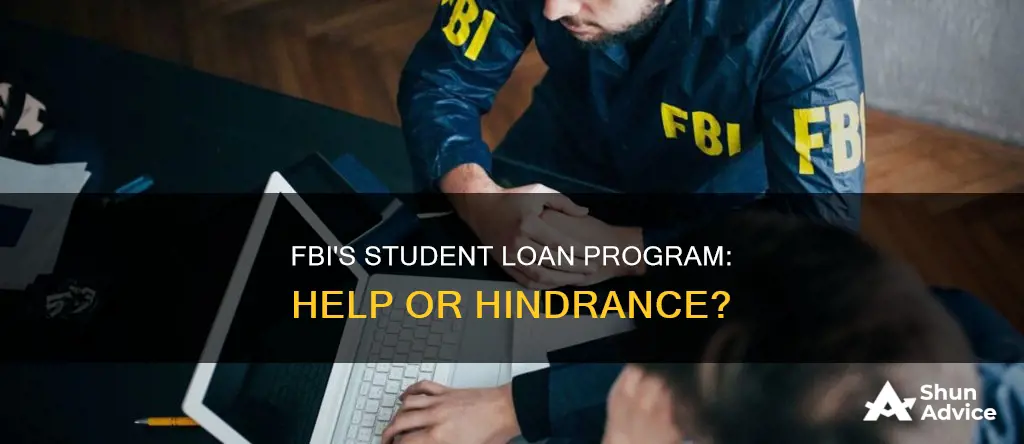
The FBI does not directly help with student loans, but it does play a role in investigating and preventing student loan fraud. The FBI has warned the public about potential federal student loan forgiveness fraud schemes, where scammers may pose as government officials or loan servicers to defraud individuals seeking loan relief. The Bureau also assists the Department of Education and other agencies in investigating and prosecuting student aid fraud, including cases of conspiracy to defraud the Department of Education and colleges. While the FBI's primary focus is on counterterrorism, cybercrime, and national security threats, they contribute their investigative expertise to combat student aid fraud and support the efforts of the Department of Education in protecting federal student aid funds.
| Characteristics | Values |
|---|---|
| Does the FBI help with student loans? | The FBI does not directly help with student loans, but it warns the public about potential federal student loan forgiveness fraud schemes. |
| What is the potential fraud scheme? | Criminal actors may defraud people seeking federal student loan forgiveness. |
| Who are the targets of the fraud scheme? | Individuals with incomes below $125,000 or joint filers with incomes below $250,000. |
| What is the Student Loan Debt Relief Plan? | The U.S. Department of Education will provide targeted student debt cancellation to borrowers with loans held by the Department of Education. |
| How much debt cancellation is provided? | Up to $20,000 for Pell Grant recipients and up to $10,000 for non-Pell Grant recipients. |
| How do fraudsters operate? | They may contact potential victims via phone, email, mail, text, websites, or other online chat services, offering assistance with the Federal Student Loan Forgiveness program in exchange for payment or personal information. |
| Is there a fee for federal student loan forgiveness? | No, the U.S. government does not charge any processing fees or require any type of payment for federal student loan forgiveness. |
| How to recognize potential fraud? | Be cautious when providing personal or financial information online. Official websites will not have spelling or grammatical errors. |
| What to do if you suspect fraud? | Consult official government websites, confirm information with the financial institution, and report suspicious activity to the FBI Internet Crime Complaint Center (IC3) and your financial institution. |
What You'll Learn

The FBI warns about potential federal student loan forgiveness fraud schemes
The FBI has warned about potential federal student loan forgiveness fraud schemes, urging the public to be cautious when seeking information about student loan debt relief. The warning comes in response to the Student Loan Debt Relief Plan announced on August 24, 2022, which offers targeted student debt cancellation for individuals with incomes below $125,000 or joint filers with incomes below $250,000.
The FBI anticipates an increase in fraudulent activity as scammers take advantage of the new government aid program. Criminals may pose as representatives of the Department of Education or financial institutions, contacting potential victims via phone, email, mail, text, or online chat services. They may also create fake websites that appear legitimate but are designed to steal personal and financial information. These scammers may claim they can help individuals qualify for the Federal Student Loan Forgiveness program and request payment for their services, which is a tactic to defraud unsuspecting individuals.
To protect yourself from these scams, the FBI offers the following advice:
- Consult official government websites, such as https://studentaid.gov, for accurate information on loan repayment and debt relief programs.
- Verify any information regarding loan repayment with your financial institution or the company providing the loan.
- Be cautious when entering personal or financial information on websites. Look out for spelling or grammatical errors, which could indicate a potential scam.
- Do not click on links in unsolicited emails or texts, as they may direct you to fake websites designed to steal your information.
- Never provide personal or financial information to unverified sources or unfamiliar websites.
- Remember that entrance into federal student aid programs through the Department of Education or their partners is always free and does not require any type of payment.
If you suspect fraudulent activity or believe you have been a victim of a scam, immediately report it to the FBI's Internet Crime Complaint Center at www.IC3.gov. Additionally, contact your financial institution to stop or reverse any suspicious transactions and preserve all relevant transaction information and communications.
Renovation Loans: Fannie Mae's HomeStyle Loan Option
You may want to see also

The Student Loan Debt Relief Plan
While the plan provides much-needed relief for eligible borrowers, it is important to be aware of potential fraud schemes. The FBI has warned the public about criminal actors who may take advantage of this plan to defraud people seeking federal student loan forgiveness. Scammers may contact potential victims via phone, email, mail, text, or online chat services, offering assistance into the loan forgiveness program in exchange for personal information or payment. It is important to remember that entrance into any federal student aid program through the Department of Education or its partners never requires any type of payment.
To protect yourself from potential scams, always consult official government websites, such as studentaid.gov, for information on loan repayment and debt cancellation. Confirm any details regarding loan repayment with your financial institution or the company providing the loan. Be cautious when entering personal or financial information on websites, and look out for spelling or grammatical errors, which could indicate a scam.
If you believe you have been a victim of a student loan debt relief scam, report it to the FBI Internet Crime Complaint Center at www.IC3.gov as soon as possible. Additionally, contact your financial institution to stop or reverse any suspicious transactions and preserve all relevant transaction information and communications. By staying informed and vigilant, you can help protect yourself from student loan debt relief scams and take advantage of the legitimate opportunities offered by the Student Loan Debt Relief Plan.
Failing a Semester: Can You Still Get Loans?
You may want to see also

Student Aid Fraud
The FBI does not directly help with student loans, but it does help combat student aid fraud. The FBI warns the public about potential federal student loan forgiveness fraud schemes. Scammers often take advantage of new government aid programs to defraud people seeking federal student loan forgiveness. These criminals may contact potential victims via phone, email, mail, text, websites, or other online chat services, claiming that they can help individuals obtain loan forgiveness or enter federal student aid programs. They may charge a fee for their fraudulent services or collect personal information to facilitate other crimes.
To protect yourself from student aid fraud, always consult official government websites, such as https://studentaid.gov, and confirm any information regarding loan repayment with the financial institution or company providing the loan. Be cautious when entering personal or financial information on websites, and look out for spelling or grammatical errors, which may indicate a scam.
If you believe you have been a victim of student aid fraud, you can take the following steps:
- Contact your financial institution immediately to stop or reverse any fraudulent transactions.
- Ask your financial institution to contact the corresponding financial institution where the fraudulent transfer was sent.
- Report the activity to the online payment service used for the financial transaction.
- Preserve any transaction information, including prepaid cards, banking records, and all telephone, text, or email communications.
- Report the fraud to the FBI Internet Crime Complaint Center at www.IC3.gov as soon as possible.
In addition, if your issue involves a private student loan or another private financial product or service, you can contact the Consumer Financial Protection Bureau at 1-800-411-2372 or visit http://www.consumerfinance.gov/complaint/#student-loan. For disputes or issues with your Federal student loans, you can contact the FSA Ombudsman's Office at 1-877-557-2575 or visit https://studentaid.gov/feedback-ombudsman/disputes/prepare.
Who Owns My Mortgage Loan? Fannie, Freddie, and You
You may want to see also

Scammers tricking people into revealing personally identifiable information
The FBI does not help with student loans. However, the FBI warns the public about potential federal student loan forgiveness fraud schemes. Scammers will take advantage of new government aid programs to defraud new pools of victims.
Scammers trick people into revealing personally identifiable information (PII) in many ways. One common method is through phishing attacks, where scammers send fake but legitimate-looking emails, texts, websites, or phone calls. They pretend to be a trusted entity, such as your bank, and trick you into revealing sensitive information like login credentials, credit card numbers, bank account information, Social Security numbers, etc. Phishing is a social engineering technique that exploits human psychology to trick people into giving away private information.
Scammers can also obtain your email address through fake contests, data breaches, or automated scraping tools that look through your social media accounts. They can learn a lot about you from what you post online and set up fake profiles to connect with you and access your private posts. Criminals can also install skimming devices on ATMs, fuel pumps, or payment terminals to capture your credit card details and steal your card number and PIN.
To protect yourself from revealing PII to scammers, be cautious of unsolicited messages and verify their authenticity by directly contacting the organization. Look for signs of phishing, such as misspelled words, unusual email addresses, and suspicious links. Use email protection tools like Proofpoint to catch threats before they reach your inbox. Additionally, exercise caution when entering PII or financial information on websites, and always consult official government websites for information on loan repayment.
Fannie Mae: Can Default Loans Be Purchased?
You may want to see also

FBI's role in investigating student aid fraud
The FBI does not generally involve itself in student aid fraud cases. This is due to their focus on counterterrorism, cybercrime, and other national security and major criminal threats. However, they do assist their partners at the Department of Education and other agencies in investigating and addressing the most egregious offenders. The FBI brings its investigative methods and techniques to the table, which have proven successful against other government fraudsters.
The FBI has played a supporting role in several student aid fraud cases. For instance, a Baltimore-area school test proctor and an admissions officer pled guilty to manipulating test scores of students taking exams to qualify for federal grants. In another case, a former inmate at a South Carolina prison applied for federal student aid using the identities of their fellow inmates. The FBI also helped uncover a scheme by a San Diego college and its financial aid director to submit falsified financial aid applications to obtain grants for ineligible students.
The FBI also provides information to the public to help them recognize the warning signs of potential fraud related to federal student loan forgiveness. They advise the public to be cautious when entering personally identifiable information or financial information on websites. The FBI also warns that the U.S. government will not charge any processing fees or require any payment for federal student loan forgiveness.
In addition to its investigative role, the FBI operates the Internet Crime Complaint Center (IC3). The IC3 serves as a central hub for reporting suspected internet-facilitated crimes, including student aid fraud.
FAFSA and Loans: What You Need to Know
You may want to see also
Frequently asked questions
The FBI does not directly help with student loans, but they do help investigate student loan fraud. The FBI assists the Department of Education and other agencies in identifying and bringing to justice those who commit federal student aid fraud.
The FBI uses its investigative methods and techniques to identify and bring to justice individuals or organizations involved in student loan fraud. They also help spread awareness about potential scams and fraud related to student loan forgiveness programs.
The FBI has been involved in multiple student aid fraud cases. One such case in San Francisco involved Kyle Edward Moore, Corto Detrice Wade, and Marcel Devon Bridges, who recruited third parties to act as "straw students" and applied for financial aid fraudulently. The FBI also warned the public about potential federal student loan forgiveness fraud schemes, where scammers target individuals seeking loan forgiveness.
If you suspect student loan fraud or if you are a victim of a scam, you should report it to the FBI Internet Crime Complaint Center at www.IC3.gov as soon as possible. Additionally, you should contact your financial institution to stop or reverse any suspicious transactions and preserve all relevant transaction information and communications.







